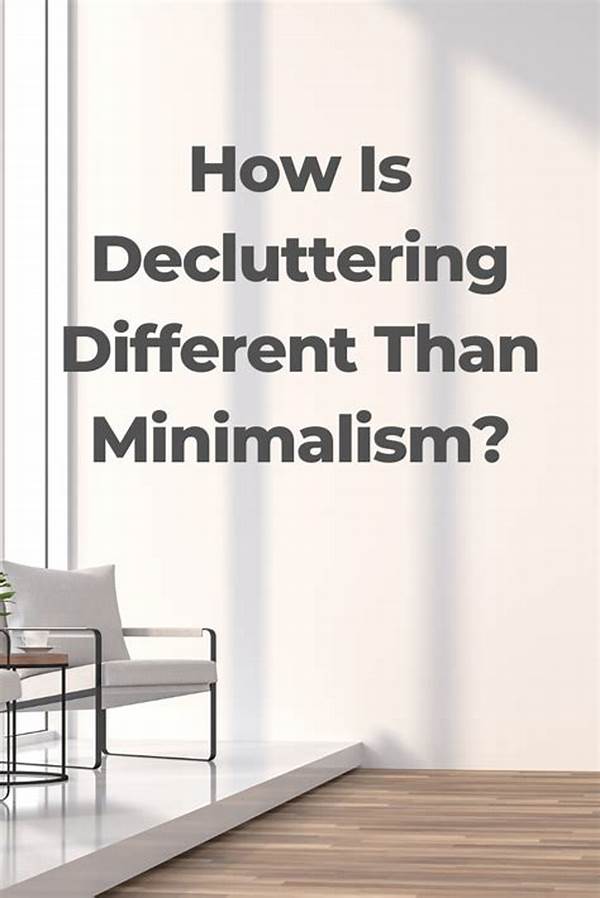- The Psychological Benefits of Minimalism
- A Deeper Dive into Minimalism’s Impact
- Harnessing Intentionality
- The Relationship between Minimalism and Environmental Sustainability
- Summaries on Minimalism
- The Intriguing Shift Towards Minimalism
- The Influence of Minimalism on Personal Growth
- The Broader Impact of Minimalism
- Guiding Principles of Minimalism
- Minimalism and Intentional Living
Why Minimalism Is More Than Just Decluttering
Read More : Trend: Minimalist Homes With Indoor-outdoor Flow
When you hear the term “minimalism,” the first thing that might come to mind is a neat, crisp image of a space emptied of unnecessary clutter. However, minimalism is more than just decluttering your living room. It’s a vibrant lifestyle, one that involves a psychological shift in how we value our possessions and prioritize our time and energy. At its core, minimalism is about finding freedom—freedom from fear, worry, overwhelm, and guilt. It’s about living intentionally, focusing on what truly matters, and stripping away the excess that overwhelms us.
Some might argue that minimalism is the key to unlocking a deeper satisfaction with life, as it opens the door for more meaningful experiences. By choosing to minimize physical items, individuals make space in their lives for valuable experiences, relationships, and personal growth. Who knew a concept that encourages ‘less’ could offer so much more? That’s exactly why minimalism is more than just decluttering—it’s a bold declaration of independence from material possessions and a heartfelt embrace of simplicity and mindfulness.
The Psychological Benefits of Minimalism
Imagine living in a house filled with only the things that bring you joy and have a clear purpose. Aside from the obvious aesthetic appeal, scientific research indicates that a minimalist environment can significantly reduce stress and improve mental health. By reducing visual chaos and the mental burden of constant tidying, individuals report feeling more relaxed, focused, and in control of their environment. If you’re intrigued by this idea, consider consulting services that specialize in minimalist transformations. One testimony claims, “After embracing minimalism, I not only found more space in my home but in my mind as well.”
A Deeper Dive into Minimalism’s Impact
Minimalism isn’t just a fad or a trend—it’s an invitation to rethink how we consume and live. Tackling minimalism involves some introspective work. It’s about understanding your own priorities, whether it’s health, relationships, or personal pursuits. Why minimalism is more than just decluttering is because it extends beyond physical spaces and asks us to declutter our hectic schedules and overflowing thoughts. When you have fewer items demanding your attention, you can more freely channel your focus towards what you truly love and are passionate about. Imagine no longer being overwhelmed by a jam-packed schedule. Instead, enjoy leisure time filled with activities that truly intrigue and invigorate you.
Discussion on Minimalism as a Lifestyle Choice
The Essence of Minimalism
Minimalism isn’t merely about keeping your home free of clutter; it’s an approach to life that guides decisions in every realm. It’s about living with intention, ensuring that every aspect of your life, from your physical space to your mental bandwidth, is freed from unnecessary distractions. For instance, adopting a minimalist lifestyle might mean opting for quality over quantity, whether in terms of possessions, relationships, or even opportunities. The rationale is simple: By clearing away the non-essential, we effortlessly create room for what truly matters—our family, our passions, our dreams.
Harnessing Intentionality
Consider this: The average American household has over 300,000 items. This staggering statistic reveals not only the abundance of items we own but also highlights how intertwined our happiness has become with material possessions. However, many find that happiness doesn’t necessarily correlate with our belongings. It’s far richer and deeper. People are increasingly sharing their stories about finding joy and meaning in having less, choosing instead to cultivate experiences and relationships. Adopting minimalism enables us to focus our energy on these areas of significant value, mapping out a life that aligns closely with our core beliefs.
The Relationship between Minimalism and Environmental Sustainability
Minimalism isn’t just about personal peace; it’s also about promoting a healthier planet. In an era where overconsumption is threatening our ecosystems, minimalism encourages mindful consumption. It diminishes our ecological footprint by supporting sustainable practices such as recycling, upcycling, or simply buying less. By consuming less, we reduce waste, conserve energy, and prevent resources from being needlessly depleted. Minimalism aligns with the principles of sustainable living, marrying our personal well-being with the health of the world around us.
In Summary: Why Minimalism is a Lifestyle
To truly grasp why minimalism is more than just decluttering, consider its expansive influence beyond the walls of your home. It’s not merely about owning fewer things; it’s about connecting more deeply and meaningfully with the world around us. It’s about prioritizing quality in every form, whether that means nurturing more profound connections, engaging in fulfilling work, or supporting ethical consumption. It’s about crafting a life that’s authentically yours, one that’s no longer weighed down by relentless accumulation but enriched through intentional living.
Summaries on Minimalism
Introduction: The Allure of Minimalism
Minimalism is more than just a neat trend; it’s a lifestyle offering tranquility in a chaotic world. While it initially gained traction as a decluttering method, minimalism has now become a way to embrace simplicity in all facets of life. Its appeal lies in the promise of more freedom—emotionally, mentally, and even financially. A minimalist lifestyle encourages deliberate choices, empowering individuals to focus on what truly sparks joy and fulfillment.
For those new to this concept, minimalism can seem intimidating. In a society that often equates success with accumulation, the idea of having less can feel counterintuitive. But that’s where the allure lies. By shedding unnecessary burdens, minimalism offers a sense of liberation, freeing individuals from the endless cycle of consumerism. It invites a fresh perspective, prompting reflection on the true essence of happiness.
The Intriguing Shift Towards Minimalism
Minimalism encourages us to ask probing questions: Why are we buying this? What purpose does this serve? Is this adding value to my life? Such introspection leads to more meaningful decision-making. More than a pursuit of a tidy space, minimalism is an invitation to examine and redefine our values. This paradigm shift can lead to enriched relationships and authentic experiences that resonate far more deeply than any tangible asset.
This intentional approach extends to every area of life, from relationships to work environments. By focusing on simplicity and clarity, minimalism enables better resource management, both personally and globally. It’s a path towards sustainable and fulfilling living—a clarion call for anyone seeking purpose and joy over congestion and clutter.
The Influence of Minimalism on Personal Growth
Minimalism and Stress Reduction
Minimalism encourages intentional living, releasing unnecessary burdens that clutter the mind and home. Studies have found that reducing physical clutter correlates with decreased stress levels, fostering a more relaxed and focused lifestyle. Many advocates of this lifestyle discuss the transformative effect of minimalism, claiming it clears mental space for personal growth and creativity.
The Broader Impact of Minimalism
Not only does minimalism improve personal well-being, but it also positively impacts environmental sustainability, promoting a reduced ecological footprint. This approach shifts purchasing decisions towards sustainable and ethically sourced products, contributing to a healthier planet for future generations. The philosophy of “less is more” permeates through personal spaces into broader societal implications, showcasing why minimalism is more than just decluttering.
Illustrations of Minimalism:
Description: Embracing Minimalism
Embracing minimalism involves cultivating an environment where intention thrives over chaos. This philosophy encourages conscious decision-making, freeing individuals from the constraints of excessive material burdens. By practicing minimalism, individuals can reduce stress, gain mental clarity, and enhance their quality of life.
Minimalism also promotes environmental consciousness, advocating for reduced consumerism and sustainable resource use. By shifting focus from material abundance to deliberate living, minimalism inspires individuals to invest in experiences, relationships, and growth, crafting meaningful lives centered around genuine fulfillment and joy. It’s a lifestyle that not only streamlines physical spaces but enriches emotional and mental landscapes as well.
Guiding Principles of Minimalism
Understanding Minimalism’s Depth
To truly appreciate why minimalism is more than just decluttering, it’s crucial to grasp its foundational principles. At its heart, minimalism champions mindful living, focusing on quality over quantity. This lifestyle encourages individuals to reflect deeply on their values and intentions, shaping a life that prioritizes meaningful experiences over material possessions. Minimalism transforms how individuals relate to their time, money, and environment, inspiring a shift from fast-paced consumption to intentional, enriching living.
Minimalism and Intentional Living
For many, minimalism is an invitation to embrace intentionality in every aspect of life. By distilling choices to what truly aligns with one’s values, individuals can cultivate a lifestyle that resonates with authenticity and joy. This choice extends beyond personal well-being, influencing sustainable development and community engagement. Minimalism is a dynamic approach that champions conscious existence, pushing past superficial decluttering to a more profound commitment to mindful and purpose-driven living.


